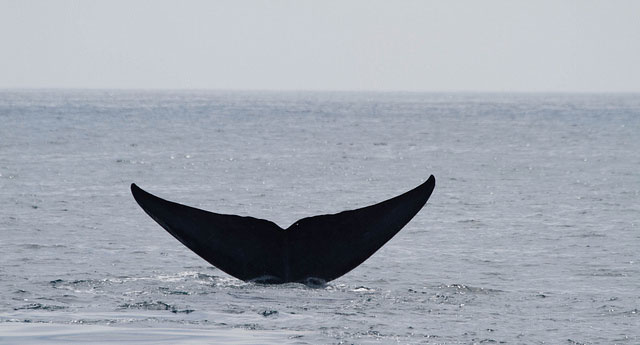
A blue whale is able to communicate with another blue whale across the breadth of an entire ocean basin, and can hear storms more than 1,000 miles away.
“Whales are reliant upon their hearing to live,” Dr. Sylvia Earle, a marine biologist, author and lecturer who has been a National Geographic explorer-in-residence since 1998 says in the documentary Sonic Sea.
Earle, who has logged more than 7,000 hours underwater, refers to the oceans as “the blue heart of the planet,” and has dedicated her life to researching and protecting them.
Part of this is due to the fact that the amount of sound humans are injecting into them is so intense and frequent that it is, at times, literally killing whales, dolphins and other sea life.
I attended a screening of Sonic Sea in Port Townsend, Washington, where Michael Jasny, the director of the Natural Resources Defense Council’s (NRDC) Marine Mammal Protection, and Dr. Kenneth Balcomb, the executive director and senior scientist at the Center for Whale Research were present.
The film, which aired last week on the Discovery Channel, states that, “We are acoustically bleaching our oceans,” and underscores several deeply disturbing facts about the ever-increasing level of noise in the sea, including that:
- Sounds can travel 17,000 kilometers underwater and still be audible
- There have been several documented instances of US Navy sonar causing brain hemorrhaging, organ lesions and bleeding from the ears in whales.
- Whale calls are literally being drowned out by ship noise
- There are 60,000 commercial ships in the oceans at any given moment.
- According to the US Navy, noise levels in the oceans are doubling every 10 years, and have been doing so for decades.
Navy Acting “Lawlessly”
Jasny has done critical work like providing the California Coastal Commission details of scientific studies that confirm the harmful impacts of Navy sonar training and testing on marine mammals, and fighting on the winning side of a settlement that required the Navy to take measures to protect endangered blue whales and other marine mammals during Naval training exercises and testing operations off the coasts of Hawai’i and Southern California.
In Sonic Sea, Jasny states, “The Navy was acting lawlessly until we took them to court.”
The first time the NRDC did that was roughly 20 years ago.
After the screening, Jasny told me, “At that time, the Navy was in complete non-compliance on every level. There were no environmental assessments, or environmental impact statements being carried out.”
“The NRDC has gone to court at least seven times against the Navy,” Jasny explained, “And we’ve won every case except one that went to a conservative Supreme Court.”
“But the Navy continues to do a lousy job of safeguarding the environment, and their consistent activities have deep impacts on whales and other species, [which] are experiencing significant impacts in both the Pacific and Atlantic Oceans,” Jasny told me.
The Navy has been reluctant to comply, every step of the way. When asked what improvements the Navy has made, Jasny said, “Only after we started applying legal pressure did they at least start paying lip service to the law.”
Oceans at Risk
Balcomb, a zoologist who went on to serve as an oceanographic specialist in the Navy then before going on to become a leading whale researcher, is also featured in the film.
After witnessing a mass stranding of whales in the Bahamas in 2000, he went on to help prove that naval sonar kills whales.
In Sonic Sea, Balcomb told a moving story of a Vietnam War veteran he knew who had multiple injuries from the war who simply wanted to see a whale. Balcomb watched as two men took the vet out in an inflatable boat, and were paid a visit by a whale.
“I watched with binoculars as the whale floated beside their small boat, and reached a fin out of the water, and rested it atop the head of the wounded vet,” Balcomb told me later. “And the veteran started picking barnacles off the whale and they just stayed that way awhile.”
The whale went on to follow the small boat back to the ship from which it had launched, at which point Balcomb said he and several other people slipped into the water, “And the whale just came up and visited each one of us.”
Back in Port Townsend, Jasny spoke to the large audience that had assembled for the screening, and asked them to imagine themselves underwater.
“Imagine dynamite going off in your neighborhood every 10 minutes, and going on and on and on,” he said of seismic testing methods used for oil-and-gas exploration off the coasts of most of the oceans around the world.
“Marine species need sound for everything they do, and have exquisite hearing,” he added. “But now the sounds of ships is ubiquitous in all of the open oceans. The average noise levels in Admiralty Inlet [in the Pacific Northwest] is higher than the maximum allowable threshold by the National Marine Fisheries Service.”
“We’re putting the oceans at risk,” concludes the film. “And if you put the oceans at risk, you put all of us at risk.”
Sonic Sea has been screening for several months across the US and internationally, with more screenings scheduled.
Join us in defending the truth before it’s too late
The future of independent journalism is uncertain, and the consequences of losing it are too grave to ignore. We have hours left to raise the $12,0000 still needed to ensure Truthout remains safe, strong, and free. Every dollar raised goes directly toward the costs of producing news you can trust.
Please give what you can — because by supporting us with a tax-deductible donation, you’re not just preserving a source of news, you’re helping to safeguard what’s left of our democracy.